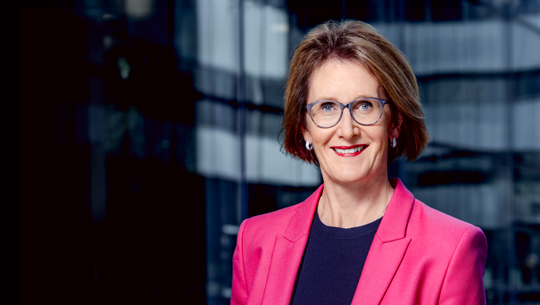Fostering diversity at work can bring huge benefits to organisations. But how can it be achieved and where should companies start? The General Manager of Roche Pharma Switzerland, Katharina Gasser, and CEO of emerging life sciences company Limula, Luc Henry, share their insights on promoting gender diversity in a large and small organisation, respectively.
Diversity in the workplace can mean hiring team members with demographic differences, in the form of gender, age, race, ethnicity, religion, neurodiversity, sexual orientation and more. We can also see diversity as bringing together people who think differently from one another. In his book Rebel Ideas, author Matthew Syed describes this cognitive diversity as ‘differences in perspectives, insights, experiences and thinking styles’. There is often overlap between these forms of diversity, as demographic differences often produce different ways of thinking. As Biopôle CEO Nasri Nahas recently remarked: ‘If I can assert one thing, 47 it’s that a Lebanese person does not think the same way as a German.’
More than a box-ticking exercise
Fostering diversity in the workplace is sometimes seen as an obligatory exercise to impress potential customers or investors. Some degree of diversity is now often required by some funders, as it shows that a company is pulling its weight to give opportunities to diverse candidates – and to create a fairer workplace. But the benefits of diversity for companies go well beyond looking good on paper.
Reams of research show that diversity gives companies a clear competitive advantage. Bringing together people with different experiences and backgrounds can broaden and deepen the knowledge of the group. This contributes to ‘collective intelligence’ – the shared, group intelligence that comes about as people work together. In a report published in December 2023, McKinsey found companies that employ over 30% of women are much more likely to financially outperform those with fewer female workers. The same holds true for ethnic diversity, as top-quartile companies in this area have a 27% financial advantage over others.
Katarina Gasser, General Manager of Roche Pharma Switzerland
As General Manager of Roche Pharma Switzerland, Katharina Gasser explains: ‘Diversity brings different perspectives to the table. When everyone shares the same mindset, teams don’t have the same ability to solve complex problems.’ Indeed, in the above-mentioned book, Matthew Syed argues that ‘the more challenging the domain, the less that any single person – or perspective – can hope to grasp’. In the domain of the life sciences, the challenges to be solved are about as complex as they get, and the benefits of diversity can therefore be immense.
The issue with yeasayers
One barrier to diversity is that we love to surround ourselves with people who are like us, a tendency called ‘homophily’. It’s comforting and makes us feel clever when others agree with us. The danger is that we end up with a narrow range of perspectives and ways of thinking – and therefore a reduced ability to solve problems and thrive as a business. CEO of Limula Luc Henry points out that homophily may seem attractive – useful, even – when first starting a company: ‘When you set off, productivity is key. And you can move much faster with people who share the same vision. So, in a sense, at this early stage a lack of diversity might help get a start-up off the ground – but you need to be aware of this and avoid falling into the trap of hiring more people like yourself beyond this initial stage.’
Stepping outside your bubble
Katharina agrees that in the very early stages of a company, founders often feel they don’t need diversity: ‘At this point the most important thing is to share the same vision – and the dedication needed to get the company off the ground. But beyond this initial stage, leaders should step back and look at the gaps in their team’s understanding – and hire to fill these gaps.’ Even in these early stages, Katharina argues it can be useful to seek different perspectives to your own: ‘When you mingle with others who have an outsider’s perspective and see things with fresh eyes, they may bring doubts or suggestions you don’t want to hear. But listening to different views is hugely beneficial – they could bring insights that save time and money in the long run.’
Katarina Gasser, General Manager of Roche Pharma Switzerland
For Katharina, talking to people who think in different ways – and therefore challenge her own views – helped her to become a stronger leader: ‘You get feedback you can reflect on, and ultimately you grow as a person too.’ Diversity also makes things more interesting. ‘We spend so much time at work, so let’s not underestimate the importance of enjoying what we do. I truly believe that being with people who do things differently is much more fun and enriching.’
Inclusivity begets diversity
Creating an inclusive, transparent culture is vital to attract a diverse team. Luc comments: ‘As an early-stage company, we must attract and retain the best talent. And sometimes the ideal candidate for a position will differ from the stereotypical start-up employee profile – like a parent, for instance. To secure them, we need to be offering a working culture compatible with their personal situation, such as part-time and flexible working hours, and time off when children are ill. We do not see diversity as a handicap, we see it as a strength. We want to build a culture that welcomes everyone.’
On gender diversity, Luc adds: ‘Women leaders empower other women in the organisation to feel like they have a place there and can climb up the career ladder. They feel represented and are more likely to bring their voice to the table. This results in a much more engaged and productive workforce.’ Katharina also explains that to get more women in leadership positions, we need more female role models: ‘I’m proud that Roche has many female leaders with families, which is inspiring for younger women as it shows that having children and an ambitious career are not incompatible.’ Diversity in healthcare teams is also key when it comes to serving diverse patients. ‘It means we bring better solutions to them because we understand their needs,’ Katharina explains.
To retain talent, eliminate discrimination
As well as representing different profiles, companies must proactively weed out discrimination. In its 2023 report Women in the Workplace, McKinsey found that microaggressions – discriminatory comments and actions that aren’t always intended to be harmful – have a major impact on women. They are ‘twice as likely to be mistaken for someone junior and hear comments on their emotional state’ as men – and this effect is compounded for Asian and Black women. We all know that unhappy employees are much more likely to quit their jobs. To retain diverse talent, then, companies must address discrimination as a priority.
Embrace disagreements and feedback
To create a workplace where everyone can thrive, listening to diverse points of view should be a priority for firms. With this in mind, as well as creating an inclusive culture and high levels of psychological safety, it’s beneficial to encourage team members to speak up – and show it’s OK to make mistakes. This will mean people can express their own views more freely. In Katharina’s experience, this can cause more disagreements, but also lead to better outcomes: ‘Sometimes, we have a leadership team meeting and I’m thinking, “It would be so much easier if everyone just agreed with each other. Can’t they just agree with me?” But although disagreements make the process lengthier, we come to solutions that are not as obvious – and much more robust.’ This should include embracing feedback from all stakeholders on a company’s diversity, equity and inclusion (DE&I) strategy.
The business case for diversity is clear. In their 2023 report on diversity, McKinsey suggests a five-point plan that companies can follow to commit to DE&I. This can act as a solid starting point for companies that want to implement and reap the benefits of diversity. But for start-ups with limited resources, it’s also OK to acknowledge that creating an inspirational workplace won’t happen overnight. As R. Roosevelt Thomas Jr., who dedicated his career to promoting cultural diversity, asserted: ‘Creating and managing a diverse workforce is a process, not a destination.’ A great starting point is to become more aware of diversity’s benefits and take simple steps to create an inclusive culture.


